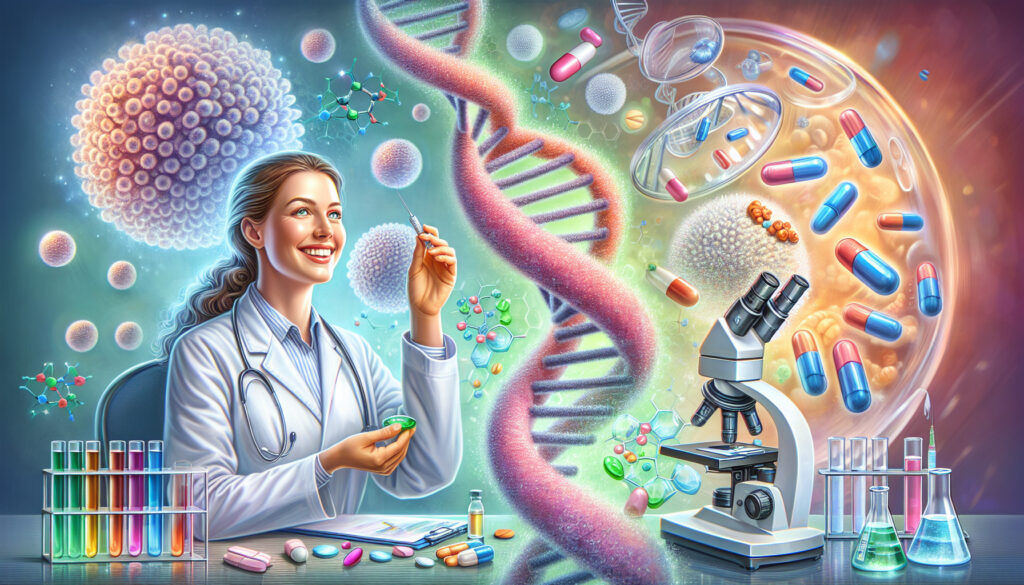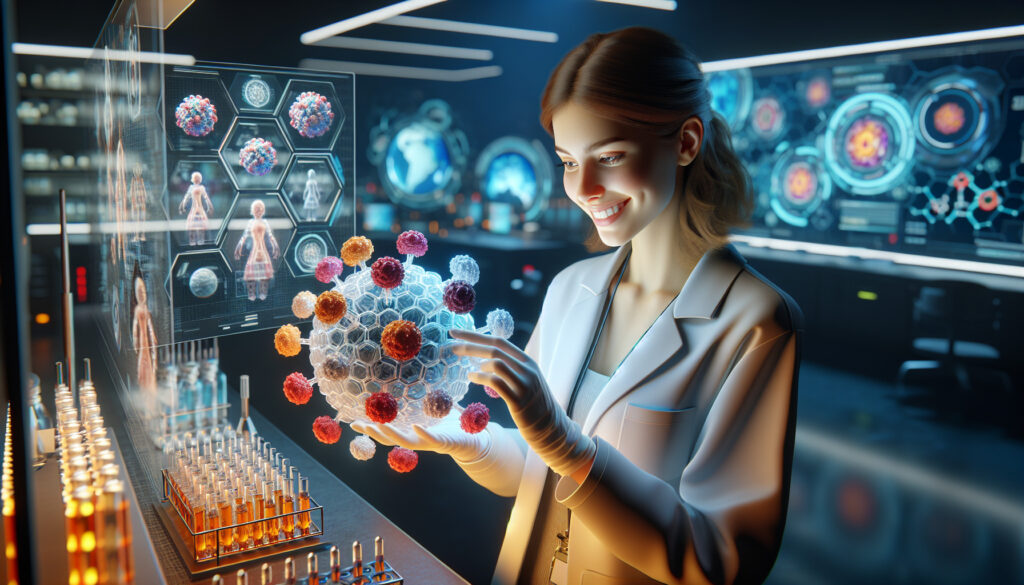
Have you ever wondered how our bodies fight off disease? 🤔 At the heart of this incredible defense system lies a tiny but powerful player: antigens. These microscopic molecules are the unsung heroes of our immune system, acting as both friend and foe in the constant battle against illness.
In recent years, antigens have taken center stage in the world of medical research, particularly in the field of immunotherapy. This groundbreaking approach to treating diseases like cancer harnesses the power of our own immune system, using antigens as a kind of biological GPS to guide our body’s defenses. But how exactly do antigens work, and why are they so crucial in the fight against disease? 🧬💪
Join us as we delve into the fascinating world of antigens and their pivotal role in immunotherapy. We’ll explore how these molecules are recognized by our immune system, their involvement in cancer development, and the exciting advancements being made in antigen-based treatments. Get ready to uncover the science behind these microscopic marvels and discover how they’re revolutionizing the way we approach disease treatment. 🚀🔬

Understanding Antigens: The Key Players in Immune Response
A. Definition and characteristics of antigens
Antigens are molecules that stimulate an immune response in the body. These substances can be proteins, polysaccharides, or other complex molecules found on the surface of pathogens, allergens, or even the body’s own cells. Key characteristics of antigens include:
- Immunogenicity: The ability to provoke an immune response
- Specificity: The unique molecular structure that allows for precise recognition
- Size: Generally larger molecules, typically over 10,000 Daltons
B. The role of antigens in disease development
Antigens play a crucial role in various diseases:
- Infectious diseases: Pathogens carry foreign antigens that trigger immune responses
- Autoimmune disorders: The body mistakenly recognizes self-antigens as foreign
- Allergies: Harmless environmental antigens cause exaggerated immune reactions
- Cancer: Tumor-associated antigens can be targeted for immunotherapy
| Disease Type | Antigen Role | Example |
|---|---|---|
| Infectious | Pathogen surface molecules | Viral spike proteins |
| Autoimmune | Self-antigens mistakenly targeted | Insulin in Type 1 diabetes |
| Allergic | Environmental substances | Pollen proteins |
| Cancer | Tumor-associated antigens | HER2 in breast cancer |
C. How antigens trigger immune responses
The immune response to antigens involves several steps:
- Recognition: Antigen-presenting cells (APCs) capture and process antigens
- Presentation: APCs display antigen fragments on their surface
- Activation: T cells recognize the presented antigens and become activated
- Proliferation: Activated T cells multiply and differentiate
- Effector response: B cells produce antibodies, and cytotoxic T cells attack infected cells
D. Types of antigens and their sources
Antigens can be classified based on their origin and properties:
- Exogenous antigens: Derived from external sources (e.g., bacteria, viruses)
- Endogenous antigens: Originate within the body (e.g., tumor antigens)
- Autoantigens: Self-antigens targeted in autoimmune diseases
- Allergens: Environmental substances causing allergic reactions
- Superantigens: Potent stimulators of T cell responses
Understanding these various types of antigens is crucial for developing targeted immunotherapies and vaccines. Next, we’ll explore how the immune system recognizes these diverse antigens to mount an effective defense against pathogens and other threats.

The Immune System’s Recognition of Antigens
Now that we understand what antigens are, let’s explore how the immune system recognizes and responds to them. This complex process involves several key components working together to protect our bodies from harmful invaders.
Memory Cells: Long-term Antigen Recognition
Memory cells play a crucial role in the immune system’s ability to quickly recognize and respond to previously encountered antigens. These specialized cells retain information about past infections, allowing for a faster and more efficient immune response upon subsequent exposures.
Antibody Production and Antigen Binding
When the immune system encounters an antigen, it triggers the production of antibodies. These Y-shaped proteins are specifically designed to bind to antigens, marking them for destruction by other immune cells. The process of antibody production and antigen binding can be summarized as follows:
- Antigen detection by immune cells
- B-cell activation and differentiation
- Antibody production by plasma cells
- Antibody-antigen binding
- Neutralization or marking of antigens for destruction
T-cell and B-cell Interactions with Antigens
T-cells and B-cells are two types of lymphocytes that play distinct roles in antigen recognition and immune response:
| Cell Type | Primary Function | Antigen Recognition Method |
|---|---|---|
| T-cells | Cell-mediated immunity | Recognize antigens presented on cell surfaces |
| B-cells | Humoral immunity | Directly bind to antigens in body fluids |
Both cell types work together to mount an effective immune response against various pathogens and foreign substances.
Antigen-Presenting Cells and Their Function
Antigen-presenting cells (APCs) are essential for initiating and regulating immune responses. These cells capture, process, and present antigens to T-cells, enabling the immune system to recognize and respond to potential threats. Key types of APCs include:
- Dendritic cells
- Macrophages
- B-cells
By presenting antigens to T-cells, APCs help orchestrate the immune response and ensure that the body can effectively combat a wide range of pathogens and foreign substances.
Next, we’ll explore how antigens play a role in cancer development and progression, setting the stage for understanding their importance in immunotherapy.

Antigens in Cancer Development and Progression
Now that we understand how the immune system recognizes antigens, let’s explore their role in cancer development and progression. Cancer cells have a unique ability to manipulate antigens, allowing them to evade detection by the immune system and continue growing unchecked.
How cancer cells evade immune detection
Cancer cells employ various strategies to avoid being recognized and eliminated by the immune system:
- Downregulation of antigens
- Expression of immune-suppressive molecules
- Recruitment of regulatory T cells
- Alteration of the tumor microenvironment
These mechanisms create a complex landscape that allows cancer cells to thrive and proliferate.
Tumor-specific antigens (TSAs)
Tumor-specific antigens are unique proteins found exclusively on cancer cells, making them ideal targets for immunotherapy. Here’s a comparison of TSAs with normal antigens:
| Characteristic | TSAs | Normal Antigens |
|---|---|---|
| Origin | Mutated genes in cancer cells | Normal cellular proteins |
| Presence | Only on cancer cells | On healthy and cancer cells |
| Immune response | Potentially strong | Usually tolerant |
| Therapeutic potential | High | Limited |
TSAs offer a promising avenue for developing targeted cancer treatments with minimal side effects on healthy tissues.
Tumor-associated antigens (TAAs)
Unlike TSAs, tumor-associated antigens are present on both cancer cells and normal cells, but they are often overexpressed in cancer. This overexpression makes them potential targets for immunotherapy, albeit with a higher risk of side effects. Common types of TAAs include:
- Oncofetal antigens
- Differentiation antigens
- Overexpressed antigens
Understanding the differences between TSAs and TAAs is crucial for developing effective immunotherapies that can target cancer cells while minimizing damage to healthy tissues.
With this knowledge of how antigens function in cancer development and progression, we can now explore how researchers are harnessing these insights to develop innovative immunotherapies.

Harnessing Antigens for Immunotherapy
Now that we’ve explored how antigens play a role in cancer development, let’s dive into how these molecules are being leveraged in innovative immunotherapy approaches.
A. Monoclonal antibodies: Targeting specific antigens
Monoclonal antibodies (mAbs) have revolutionized cancer treatment by precisely targeting tumor-specific antigens. These engineered proteins act like guided missiles, seeking out and binding to cancer cells with remarkable specificity.
- Mechanism of action: mAbs attach to specific antigens on cancer cells, triggering immune responses or directly inhibiting cell growth
- Examples: Rituximab (targets CD20 in lymphomas), Trastuzumab (targets HER2 in breast cancer)
B. Checkpoint inhibitors: Enhancing T-cell responses to tumor antigens
Checkpoint inhibitors work by removing the “brakes” on the immune system, allowing T-cells to recognize and attack cancer cells more effectively.
| Checkpoint Inhibitor | Target | Cancer Types |
|---|---|---|
| Pembrolizumab | PD-1 | Melanoma, lung cancer |
| Ipilimumab | CTLA-4 | Melanoma |
| Atezolizumab | PD-L1 | Bladder cancer, lung cancer |
C. Adoptive cell therapies: Engineering T-cells to recognize cancer antigens
This approach involves modifying a patient’s own T-cells to better recognize and attack cancer antigens.
- CAR T-cell therapy: T-cells are engineered to express chimeric antigen receptors (CARs) that target specific tumor antigens
- TCR-modified T-cells: T-cells are modified to express T-cell receptors (TCRs) that recognize tumor-associated antigens
D. Cancer vaccines: Stimulating immune responses against tumor antigens
Cancer vaccines aim to educate the immune system to recognize and attack cancer cells by presenting tumor-specific antigens.
- Preventive vaccines: Target viruses that cause cancer (e.g., HPV vaccine)
- Therapeutic vaccines: Stimulate immune responses against existing tumors
These innovative approaches demonstrate the power of harnessing antigens in immunotherapy, offering new hope for cancer patients. Next, we’ll explore recent advancements in these antigen-based immunotherapies.

Advancements in Antigen-based Immunotherapies
Combination Therapies for Enhanced Antigen Recognition
Combination therapies have emerged as a powerful approach to improve antigen recognition and boost the efficacy of immunotherapies. By targeting multiple aspects of the immune response, these treatments can overcome resistance mechanisms and enhance overall outcomes.
| Therapy Combination | Benefits |
|---|---|
| Checkpoint inhibitors + Vaccines | Enhances T cell activation and tumor recognition |
| Oncolytic viruses + CAR-T cells | Improves tumor infiltration and antigen presentation |
| Bispecific antibodies + Chemotherapy | Increases tumor cell death and antigen release |
CAR-T Cell Therapy Improvements
Recent advancements in CAR-T cell therapy have focused on enhancing antigen specificity and reducing side effects:
- Development of “armored” CAR-T cells with improved persistence
- Dual-targeting CAR-T cells to reduce tumor escape
- Allogeneic CAR-T cells for off-the-shelf availability
Bispecific Antibodies: Dual Antigen Targeting
Bispecific antibodies represent a significant leap forward in antigen-based immunotherapies. These engineered molecules can simultaneously bind to two different antigens, facilitating more precise targeting of cancer cells and improved immune cell activation.
Personalized Neoantigen Vaccines
Neoantigen vaccines tailored to individual patients’ tumor mutations have shown promising results in clinical trials. This approach leverages cutting-edge genomic sequencing and bioinformatics to identify unique tumor antigens, leading to highly personalized and potentially more effective immunotherapies.
As we explore these advancements, it becomes clear that antigen-based immunotherapies are rapidly evolving, offering new hope for cancer patients. The next section will delve into the challenges and future directions in this exciting field.

Challenges and Future Directions in Antigen-based Immunotherapy
As we explore the future of antigen-based immunotherapy, several challenges and exciting opportunities emerge. Let’s delve into the key areas that researchers and clinicians are focusing on to advance this promising field of cancer treatment.
A. Expanding immunotherapy to more cancer types
While immunotherapy has shown remarkable success in certain cancers, expanding its efficacy to a broader range of tumor types remains a critical goal. Researchers are:
- Investigating novel antigen targets specific to different cancer types
- Developing combination therapies to enhance immune response
- Exploring personalized approaches based on individual tumor profiles
B. Minimizing side effects and toxicities
Reducing adverse effects is crucial for improving patient outcomes and quality of life. Strategies include:
- Fine-tuning antigen specificity to minimize off-target effects
- Developing safer delivery methods for immunotherapeutic agents
- Implementing better patient monitoring and management protocols
C. Improving antigen discovery and selection
Identifying the most effective antigens is key to successful immunotherapy. Advancements in this area include:
| Approach | Description |
|---|---|
| AI and machine learning | Using computational methods to predict and prioritize potential antigens |
| High-throughput screening | Rapidly testing large numbers of antigens for immunogenicity |
| Single-cell sequencing | Analyzing individual tumor cells to identify unique antigen profiles |
D. Overcoming tumor heterogeneity and antigen loss
Tumors can be highly diverse and may evolve to evade immune recognition. To address this challenge, researchers are:
- Developing multi-antigen targeting approaches
- Investigating dynamic antigen landscapes during treatment
- Exploring combination therapies to target different aspects of tumor biology
As we move forward, these challenges present opportunities for groundbreaking discoveries that could revolutionize cancer treatment. The next frontier in antigen-based immunotherapy lies in addressing these obstacles and unlocking the full potential of the immune system in fighting cancer.

Antigens play a crucial role in our immune system’s ability to recognize and fight off foreign invaders, including cancer cells. By understanding the intricate relationship between antigens and the immune response, scientists have developed innovative immunotherapies that harness the body’s natural defenses to combat cancer. These advancements have led to promising treatments that offer new hope for patients with various types of cancer.
As research in antigen-based immunotherapies continues to evolve, we can expect to see more targeted and effective treatments in the future. While challenges remain, such as improving response rates and minimizing side effects, the potential of antigen-based immunotherapies to revolutionize cancer treatment is undeniable. By staying informed about these developments, patients and healthcare professionals can make more informed decisions and contribute to the ongoing progress in the field of cancer immunotherapy.

